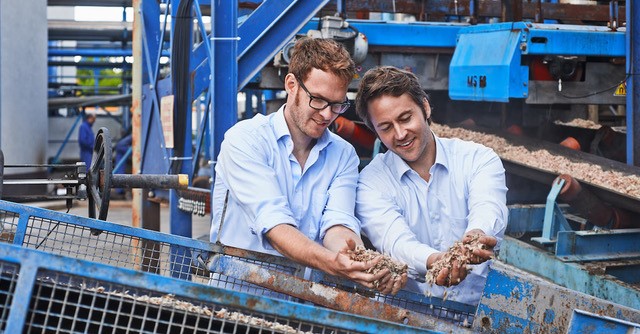
Don’t believe the hype: Making good use of a blackout
The Spanish blackout of April 2025 is an opportunity to strengthen electricity systems that have higher shares of renewables and should not be used as an excuse to slow down the energy...

by Julia Binder Published October 8, 2021 in Sustainability • 12 min read
For anyone who needed a reminder for the urgency to tackle climate change, the most recent IPCC report should have served as a cruel wake-up call. In fact, despite lip service from a variety of political and business leaders, we are still lacking truly ambitious initiatives to radically reduce global carbon emissions and to effectively conserve biodiversity. With a few notable exceptions, the majority of business leaders has yet to declare climate emergency and take bold climate action. Sustainable entrepreneurs, on the other hand, often serve as a positive reference point for leaders of a truly inclusive and regenerative economy. The admiration for these entrepreneurs goes so far that the media often evokes the picture of a “heropreneur” when referring to these inspirational leaders on the quest to bring about positive changes in our economy and society.
While you don’t have to be a die-hard Marvel fan to hope for a superhero to solve all our problems, the truth is that no actor alone has the power to envision, let alone implement and scale, all the solutions required for bringing about the necessary changes in our world. While this might sound discouraging at first, it also empowers each individual to play a role in changing the system that gives rise to the most severe problems of our time. Why is this good news? Because it allows us to take ownership for the change we want to see in our economy and society. Instead of waiting for a superhero to redeem us, we are called upon as business leaders, policy makers, and customers to become creators of a different future. The global challenges we face are so complex, manifold, and intertwined that they require collective efforts and systemic solutions. Seen in this light, sustainable entrepreneurs are not lonely heroes, but rather embedded ecosystem actors who offer important blueprints for moving our economy towards a more sustainable, inclusive, and resilient future.
So, no, unfortunately entrepreneurs alone won’t change the world, but here is how their activities lay the foundation for a more regenerative economy.
There is an increasing realization that the “take-make-waste” mode of organizing is not sustainable – not for the planet, not for our societies, and not for ourselves. While capitalism has provided us with unprecedent technological progress and economic growth, its relentless pursuit of profits has also resulted in social inequalities and environmental destruction of historic proportions. Taking a look at the workplace inside these organizations, we are faced with a supposed dichotomy: on the bottom, we find unfulfilled workers who often have to engage in tedious and monotonous activities to barely earn enough to make a living; on the top, we find seemingly fortunate managers who often have to sacrifice family and free time to succeed in their job. While their working realities within organizations could not be more different, in both situations, studies find that feelings of emptiness, resignation, and frustration are increasing among workers and managers alike. In a system that apparently produces more losers than winners, the time seems ripe for a new work culture, one that prioritizes human resourcefulness and resilience.
Prioritize employees’ mental and physical health; establish mindfulness at work; reduce meeting times; allow for unlimited/on-demand vacation time.
Nurture trust and solid relationship; invest in continuous learning; provide supportive work environment; offer access to contemplative practices; ensure healthy work-life balance; organize regular peer-to-peer feedback.
Empower employees to take ownership of their projects; share responsibility through self-management structures and team decision making; encourage new ideas and experimentation.
Remove/reduce hierarchies and reporting structures; establish democratic and transparent salaries; remove compensation inequalities; realize steward-owned companies; enable flexible working arrangements.
Sustainable entrepreneurs have long sensed the importance of reorganizing the way we work. Many have experienced the emotional voids of a workaholic lifestyle first-hand and have left well-paid and prestigious positions in search of purpose in their professional and personal lives. One major transformation pushed by these entrepreneurs relates to the shift from hierarchical power and individual leadership structures towards company-wide participation, collaboration and co-determination across all organizational decisions. Sustainable entrepreneurs across different industries successfully pioneer such new work initiatives in their organizations, thereby attracting and retaining talented young workforce with their alternative working concepts. These new ways of working not only contribute to more fulfilled and healthier employees, but also to the resilience of the organization as a whole, which is particularly important in face of the burgeoning challenges our society is facing.
It is important to acknowledge that companies are making notable progress towards addressing sustainability as part of their business activities and that net-zero plans have become mainstream across organizations and industries. Today, it is unlikely to find CEOs who would declare that their companies are not concerned about reducing their social and environmental impact. So if sustainability considerations have found their way into the C-Suite level of companies, why do social and environmental problems persist, sometimes even getting worse? For one thing, the realization alone that sustainability is important is not sufficient to have an impact. In fact, many leaders have yet to walk-the-talk or have to set more ambitious and timely sustainability targets. With respect to the speed of change, the COVID-19 crisis has further decelerated progress against the UN Sustainable Development Goals. Additionally, many companies rely on offsetting practices only, which in the worst-case means business-as-usual compensated by planting trees or buying carbon credits. While most businesses are thus challenged to more fundamentally adapt their strategies and business operations, several large enterprises are already taking a leading role in spearheading ambitious sustainability transformations. In fact, the World Business Council for Sustainable Development (WBCSD) has recently introduced its “Vision 2050”, a truly ambitious shared vision and framework for sustainable transformations – from business leaders for business leaders.
Besides the transformative efforts of these leading sustainability business champions, sustainable entrepreneurs across industries seek to radically change entire industries by providing a blueprint of truly holistic and inclusive organizations. While they act in a niche and benefit from their smallness, agility and flexibility, their activities serve as important pinpricks for incumbent industry players. By showing that different forms of organizing, producing, and consuming are possible, and may even outperform conventional ways, they seek to push entire industries to adopt more impactful sustainable business practices.
Expand traditional economic bottom line by equally weighting social and environmental impact with profit; align new or existing business models with sustainability principles; phase out products that violate sustainability thresholds.
Drive the shift from focus on economic growth (GDP) to human-centered metrics (for example, gross happiness/wellbeing index); adopt impact KPIs; reinvest profits in purpose.
At a moment where many of the fundamental tenets of our economic system are critically questioned, the shift from individual organizing to collective action cannot be left out of the equation. The pandemic has served as a painful eye-opener for just how much we rely on global collaboration and a common agenda when aiming to tackle complex global societal challenges. Ironically, in light of physical social distancing, we, as societies, seem to have come closer together in terms of solidarity and social support. Similarly, companies which would have never envisioned joining forces with a rival company have collaborated in an effort to tackle the crisis. International research collaborations and open scientific endeavors have allowed for the discovery of COVID-19 medication and vaccination in record time. Could it be that in the end something positive emerges out of the current pandemic, that is, a shared sense of understanding that global problems require global collaborative solutions?
For sustainable entrepreneurs, co-creating, co-executing, and co-impacting lies at the heart of their organizations. Similar to social movements, many sustainable ventures are explicitly organized in ways that ensure inclusive and participatory governance, which in some cases is even formalized through cooperative legal structures. Beyond their own ventures, these entrepreneurs are joining forces with all possible stakeholders to collectively reach overarching impact objectives, for example by raising public and industry awareness for relevant sustainable issues, engaging in debates or by lobbying for specific societal causes.
Act at the local level to achieve impact on a global level; marshall collective resources in communities to realize social justice and ecological sustainability; engage in cross-sector collaboration in online communities (for example, open source projects).
Launch new movements for collective impact; promote movement in local, national, and international politics; empower individuals to act.
As we are increasingly encountering the limitations and detrimental effects of our “take-make-waste” model of organizing, calls for a systemic transformation, one that puts humans and the natural environment at the center of economic activity, are getting louder. While some believe that such fundamental transformations can be achieved by realizing truly ambitious net-zero initiatives, by internalizing social and environmental costs, and by incorporating ESG considerations across all investment decisions, others believe that such initiatives are not far-reaching enough and that we need to critically question some of the central tenets of our capitalistic system to turn the wheel around. Such a post-growth worldview stands in stark contrast to our current linear cradle-to-grave, profit maximizing and growth pursuing capitalistic system that externalizes social and environmental costs. It suggests that we require a new economic model, one that takes a systemic and truly holistic perspective on businesses that are economically just, serve society and that are respectful of planetary boundaries. While sustainable entrepreneurs alone cannot transform the economy in one way or the other, their activities play an important role in de-risking new ways of working, in introducing new ways of doing business, and in utilizing collective action for new ways of scaling impact. It is to be hoped that their pioneering activities leave a mark on the economy and serve as an inspiration and aspiration for business leaders, policy makers, and customers alike.

To «”unf**k the economy” (to use their words) and realize their vision of the future of work, the two co-founders Waldemar Zeiler and Philip Siefer have adopted an innovative steward-ownership model for Einhorn, which builds on self-governance from people inside the organization and those close to its mission and ensures that profits are reinvested or donated towards advancing the company’s purpose. Pioneering new work structures is at the heart of the sustainable start-up, which puts employee’s well-being, motivation, and satisfaction at the core of organizational decision making. Their fluid organizational structures are structured around transparent and democratic salaries, team decision making, and a unlimited vacation policy. The company has no formal hierarchical structures, leadership is distributed among the entire team, and while – or because? – there are no KPIs, performance or sales targets, employees feel committed to and responsible for the success of the company. In fact, even though Einhorn does not measure its success in financial terms, the start-up made a revenue of over €6 million ($7 million) in 2020, almost tripling its revenues in just two years. By freeing their employees from the pressure of conventional demand and control mechanisms, they seek to unleash the creative and innovative potential of their employees. Self-organized teams, democratic and transparent salaries, and unlimited holidays – what sounds utopian is receiving increasing interest from large corporations and may as well provide a first glimpse into the future of our work.

For Polarstern, the energy transformation and transporting the common good idea are cornerstones of their business activities. They differentiate themselves from their competition by offering energy from 100% renewable resources, and contribute to the worldwide energy transition by supporting local farmers in Cambodia or Madagascar with microcredits to afford their own biogas plants. Furthermore, with their decentralized energy solution, they enable tenants in urban areas to get access to affordable, locally produced renewable energy. This electricity cannot only be used for household consumption and heating, but also provides a sustainable solution for the charging of electric vehicles. As a company they are committed to the Common Good Economy, which is a movement that holds companies accountable to the values of human dignity, solidarity and social justice, environmental sustainability and democracy. Based on a comprehensive reporting matrix consisting of 20 themes, companies are challenged to consider all dimensions of an organization’s contribution to people and planet. To promote the transition to a sustainable economy beyond their business, Polarstern is collaborating with partners, competitors, politicians, and customers to bring a greater orientation toward the energy transformation and common good economy.
Entrepreneurs for Future is an initiative that brings together more than 5,000 companies to clearly signal that business actors demand more climate protection. Mobilizing entrepreneurs from all industries, the movement seeks to declare entrepreneurs’ solidarity and full support with the strikers.
Inspired by the Friday for Future and Scientist for Future movements, the aim of the Entrepreneurs for Future initiative is to take responsibility as representatives of the economy. Having provided a proof-of-concept that an alternative, sustainable way of doing business is possible, they seek to push the government to create more ambitious regulatory frameworks that have the potential to transform the economy as a whole. In their statement, Entrepreneurs for Future demand, among others, a speed up of the transport and energy revolution, the introduction of a CO2 pricing mechanism and a shift towards the circular economy – all with the aim to allow companies to work together to meet the ambitious 1.5°C target set at the 2015 COP in Paris.

Professor of Sustainable innovation and Business Transformation at IMD
Julia Binder, Professor of Sustainable Innovation and Business Transformation, is a renowned thought leader recognized on the 2022 Thinkers50 Radar list for her work at the intersection of sustainability and innovation. As Director of IMD’s Center for Sustainable and Inclusive Business, Binder is dedicated to leveraging IMD’s diverse expertise on sustainability topics to guide business leaders in discovering innovative solutions to contemporary challenges. At IMD, Binder serves as Program Director for Creating Value in the Circular Economy and teaches in key open programs including the Advanced Management Program (AMP), Transition to Business Leadership (TBL), TransformTech (TT), and Leading Sustainable Business Transformation (LSBT). She is involved in the school’s EMBA and MBA programs, and contributes to IMD’s custom programs, crafting transformative learning journeys for clients globally.

July 9, 2025 • by Cédric Philibert in Sustainability
The Spanish blackout of April 2025 is an opportunity to strengthen electricity systems that have higher shares of renewables and should not be used as an excuse to slow down the energy...

July 7, 2025 • by Julia Binder, Esther Salvi in Sustainability
Lindström found that expanding its business to Asia required overcoming cultural barriers as much as building new services and infrastructure while adapting itself to local needs. ...

June 16, 2025 • by Núria Ibáñez-García in Sustainability
Driving change in a system where progress can be slow and regulation is tight isn’t easy. But for Núria Ibáñez-García, sustainable transformation starts with steady influence, applied from within. ...

June 9, 2025 • by Julia Binder, Esther Salvi in Sustainability
Dr. Kiri Trier, the beauty giant’s regional sustainability chief, explains her drive to change customer habits and make cutting waste, refilling, and recycling part of their daily bathroom routine....
Explore first person business intelligence from top minds curated for a global executive audience